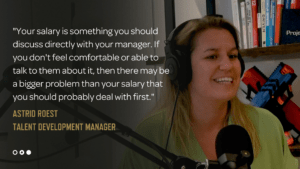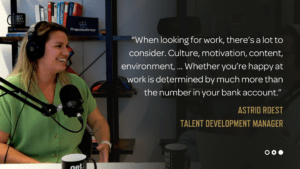Podcast: Let’s talk money: everything you need to know about salary negotiations
on 27 November 2023 for GraduatesMoney. For some it’s an uncomfortable subject, for others it’s easy to talk about. But we all need it to pay the bills. And whichever way you look at it, salary is an important aspect of job satisfaction. Astrid Roest, Talent Development Manager at Exellys, has some expert tips on how to find out what you’re worth and how to ask for it. Listen to our podcast below, or if you don’t understand Dutch and/or don’t have time to listen to the whole talk, read the blog!
Let’s meet our guest, Astrid Roest.
- Studied Industrial and Organisational Psychology at university
- Started working as a Tech Talent Scout at Exellys 7 years ago
- Promoted to Talent Development Manager 5 years later
- Spends her free time with her dog Izzy and enjoys nature walks
- Likes to travel and go out to eat

We love food, we love travel, and of course we have to feed the dog too. These resources have to come from somewhere. So today we’re going to talk about salary. Let’s say you want to ask for a pay rise. How do you raise the subject?
Most organisations have an existing format for raising these issues. This could be a regular performance review or feedback meeting. This is the most logical time to have a conversation about your salary.
If you don’t have such a format, you probably have regular one-to-one meetings with your manager. This is also an opportune time to raise the subject of a pay rise, as you’ll be having a private, face-to-face conversation with your direct line manager.
If you don’t have these one-to-one meetings, or you’d have to wait too long for one of the existing opportunities, then it’s up to you to ask your boss for a meeting. You can simply tell them you’d like to discuss a few things and ask when it would be convenient for them. It’s important to keep the tone of this invitation light. You could mention that you’d like to discuss your salary if you feel up to it, but you don’t have to. In any case, be sure to ask for a face-to-face meeting. This isn’t the kind of conversation you want to have over the phone.
It is best to speak to your manager directly. However, if you don’t feel comfortable or even able to talk to them in person, you can always talk to HR. Although I would not recommend this. This is really a matter to be discussed with your manager, and if you can’t discuss it with them, then there may be a bigger problem than your salary that you should probably deal with first.

Let’s say you’re at an interview for your first job and the interviewer asks about your salary expectations. I can imagine that it’s difficult to estimate how much you can or should ask for. How do you prepare for this question?
It’s a good idea to prepare an answer to this question, as being silent when asked doesn’t look good either. There are several sources you can consult to get an idea of what would be a realistic expectation.
- Use your network. When you graduate, you won’t be the only one looking for your first job. Ask your classmates what they’ve been offered so you can get a feel for the salary range you can expect.
- You can find a lot of information online. You can ask Google or ChatGPT, of course, but you can also visit websites like Glassdoor or Jobat. They have a lot of information about what a person in a particular role with a particular background and experience usually earns.
- Ask your student union. Sometimes they have a ballpark figure and share it with their members.
Once you have an idea of a realistic salary range, what is the next step?
Then prepare the conversation. If you’re asking for a figure or a raise, they’re going to ask you why you deserve it. Make sure you’ve thought about why you’re worth that amount of money. What do you bring to the table? What skills or experience do you have? When have you gone above and beyond the call of duty or done something extra to show you’re ready for more responsibility – and more money? Make sure you are clear on these points before you go into the meeting.
It’s also a good idea to practise. It helps if you’re not having this conversation for the first time when it really matters. Practice makes perfect. So ask someone you trust to role play with you. Maybe they’ll ask a good question that you weren’t expecting, so you can prepare a response. You can also ask for feedback. How were your arguments? Were they clear and convincing? How was your non-verbal communication? If you look fidgety and nervous as you list your achievements, you won’t come across as strong as if you can sit calmly and confidently in front of the other person.
In short, don’t over-engineer, but be prepared. Be prepared for a no, too. Unfortunately, even if you’ve done your homework and prepared your arguments carefully, you may still not get the salary you’re asking for. It’s important to know how to deal with this. You can and should ask why. Is there anything more you could do to get a yes next time? Is it a question of money? The company may not be able to offer you that, even if they wanted to. It’s important to know why so that you don’t make assumptions that could sour the relationship between you and your employer in the future.

When we talk about salary, we tend to focus on one number: the figures that appear in your bank account at the end of each month. But isn’t income much more than a salary?
Indeed, there’s a lot more to your pay package than the gross salary on your payslip. When you negotiate your salary, don’t put too much emphasis on that figure. There are a lot of other things you can get that have a huge impact on your take-home pay. Just think of perks like a laptop, smartphone, telecom subscription, home office allowance, car, fuel or electricity card, eco cheques, group insurance and so on.
When you’re negotiating your pay package, think about what you really want or need. Take a company car, for example. It’s a very popular perk, but maybe you don’t need one. Maybe it would be better for you if the organisation offered a mobility budget that you could use to lease a fancy e-bike, for example. Don’t look too much at what others have, but really think about what will make your life better when it comes to putting together your pay package.

Now for the interview itself. Once you have prepared, what can you do to make the meeting go as smoothly as possible?
Don’t underestimate likeability. It’s still a conversation between people. If you come across as arrogant, the other person is much less likely to give you what you want. It’s a simple human reaction.
Always keep the conversation friendly and professional, even if you’re told no. Don’t throw insults or furniture around as this will ruin your relationship with your employer and any chance of getting anything done in the future. Confidence yes, arrogance no! If you’re not sure how you come across, you can always use your role-play exercise to test this.
Finally, don’t try to squeeze every last drop out of the negotiation. Maybe you have a must-have and a few nice-to-haves. You don’t have to win every time. If there’s a thorny issue but it’s on your nice-to-have list, just let it go and move on. Don’t think in terms of winners and losers; your employer is not your enemy, trying to give you as little as possible. In fact, you can both win!

Say there’s a lower limit that’s not being met. How do you deal with that?
It’s good to know what your absolute minimum is before you go into the interview. What’s your walk-away point? Once you’ve set this limit, make sure it’s really your walk-away point, meaning that if you had to take anything less, you’d be prepared to walk away from the job altogether. When negotiations reach this point, it’s important that you really do opt out. If you end up agreeing to 200 euros less, you’re setting the tone for the rest of your relationship. And you can’t really go back on that. If you regret saying yes to this offer, you can’t go back two days later and ask for a renegotiation.
But as a general rule, try to avoid ultimatums as much as possible. It won’t help your likability or the mood of the conversation if you start making demands. Nobody likes that. However, if you do have a deadline, let’s say in the context of multiple applications, then you can be transparent about it without becoming demanding.

Finally, what would you say to readers or listeners who are currently looking for their first job?
Well, for the purposes of this podcast, we’ve talked about salary and compensation packages, but when you’re looking for a job, there’s a lot to consider. A job is so much more than pay. It has to be an environment that you want to be in, a culture that suits you. It doesn’t matter how much they pay you, if you don’t feel good at work, you won’t be happy. You have to think about what’s important to you at work, what gives you satisfaction, what motivates you, what issues you want to work on. Whether you’re happy at work is determined by much more than the number in your bank account.
Listen to the entire episode right here
About Exellys
Exellys is a Talent Incubator. We match ambitious companies with the finest talent. Are you ready to drive the innovations of tomorrow? Ready to make an impact and become a future-fit digital leader?
Whether you are a graduate or (young) professional, Exellys will unlock your full potential by guiding you to a challenging work environment that perfectly matches your personality, expectations and ambitions.
On top of that, you are enrolled in one of our very own training and coaching programs (based on your personal and professional ambition and experience). This means that, while working as an Exellys consultant, we are helping you to bridge your ambition to excellence.
Through intensive training and coaching, you’ll gain the essential skills, competencies and knowledge necessary to become the highly effective professional you aim to be. Become an Exellyst and get in touch with us today!





